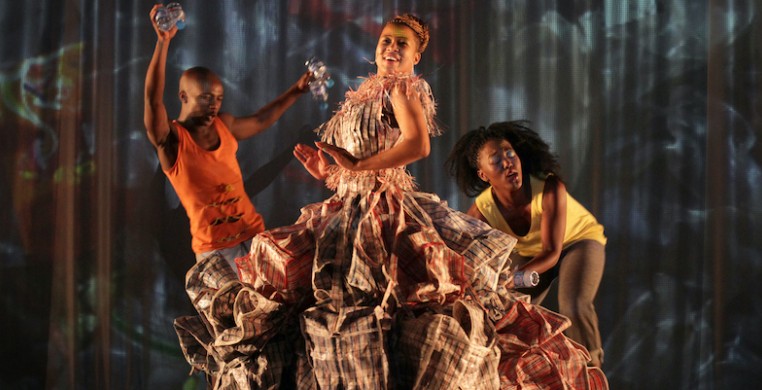I came home from a long day and sat down in my living room expecting to quietly watch some contemporary dance. If you, reading this, are familiar with Robyn Orlin and her work, then you’ll know that was not the case at all. Instead, I experienced something loud, blunt, a little confusing and the perfect antidote for passive, sitting-on-my-couch-watching-dance-on-a-small-screen that has mostly defined virtual performance up to this point of the pandemic.
The piece was a 2012 archived recording of Robyn Orlin’s “Beauty remained for just a moment then returned gently to her starting position,” presented at the 22nd (Digital) JOMBA! Contemporary Dance Experience on Sept 4. It relied on an assortment of images projected onto long strips of white sheet hanging across the back of the stage, heavy audience participation and big, vocal personalities from the cast to delve into the contradictions of how we label and attempt to control beauty in a classist world.
As a writer from Chicago, I viewed the performance as an outsider to Orlin’s work and the JOMBA! festival (which is based in South Africa annually). Post performance, I went down a rabbit hole of researching the culture of waste reclaimers (informally known as waste pickers) in South Africa, typically self-employed people who separate and collect recyclable materials from trash around the city to sell to recycling depots. Despite doing work that cuts landfill costs and helps keep city streets clean, these workers are often seen as dirty and are mistreated or expelled from upper-class areas.
At the beginning of the work, dancer Julia Burnham led a participatory exercise with the audience where she prompted them through a series of sounds by shaking plastic water bottles and gurgling the water, presumably provided to everyone before the performance. As the audience stared at a projected image of the sun, they were instructed to crumple their water bottles, creating a soothing rain noise. The projection turned into a snake and Burnham disrupted the calm, shouting, “That is disgusting! Let’s get rid of it.” She instructed the audience to throw their water bottles at the snake projection and a snake-costumed dancer on stage. She called the assortment of plastic trash a “beautiful installation.” The cast then hurried to collect the water bottles and store them in Burnham’s ball gown (made out of a bunch of tote bags sewn together), calling to mind the large bags of recycled materials that waste reclaimers are notorious for carrying.
As a white woman coming to terms with my own place and purpose in a society overwhelmed with systemic racism, poverty and climate change, I struggled to dissect this work because I relate more in status to the people deciding standards of “beauty” (or standards of race and class and economic status) than to the situations of the populations that I feel this piece was trying to support. Which makes me curious of Orlin’s intentions in making “Beauty remained...” as she is a white choreographer creating with a cast of Black dancers.
Orlin and the dancers seemed to give one simple place to start approaching these contradictions—by acknowledging the beauty of things and people we might initially find disagreeable or maybe prefer to ignore. But really, I feel the cast claimed this dance for themselves and for those who have felt discarded from society.
In a one-way conversation as dancer Teboho Letel attempted to grab God’s attention, he asked, “Have you found your own beauty, God? I’ll show you my beauty. Do you like my skin?” God never answers, but the dancers find solace in celebrating their own selves in an end-of-performance montage where each dancer’s name and image projects onto the sheets--and they get their own moment to be with the audience.
--
This piece was produced as part of the inaugural See Chicago Dance Critical Writing Fellowship in partnership with JOMBA! Contemporary Dance Experience and the University of KwaZulu-Natal (Durban, South Africa), the University of the Witwatersrand and The Ar(t)chive (Johannesburg, South Africa) and the University of East London (London, UK). Financial support is provided by the U.S. Consulate in Durban, the National Endowment for the Arts and the Chicago Department of Cultural Affairs and Special Events.
Fellow Jordan Kunkel is a Chicago-based dance artist, videographer, writer and choreographer who aims to build community and aid activism through her work. She received her B.A. in dance and journalism from Loyola University Chicago in 2018. As a working professional, she combines her passions for dance, writing and multimedia to advocate for and promote the arts.


